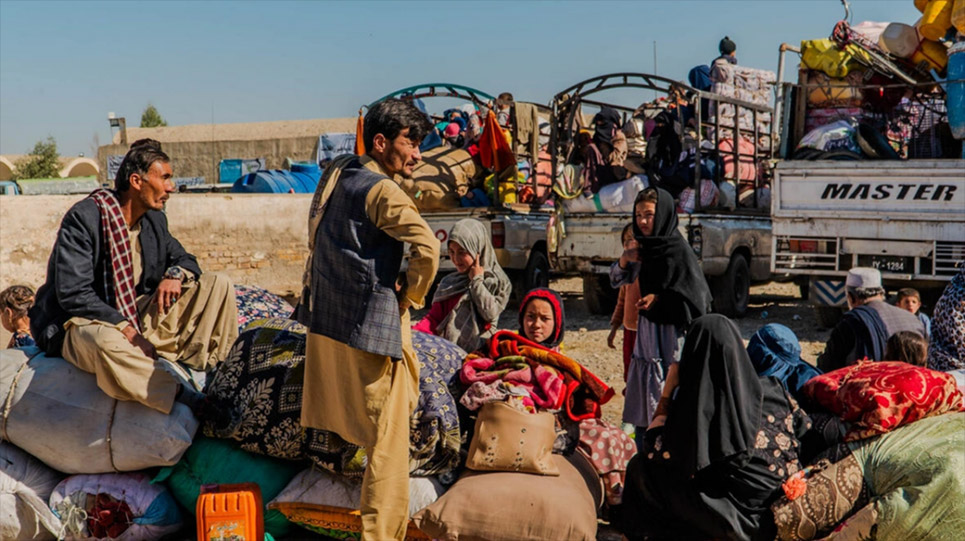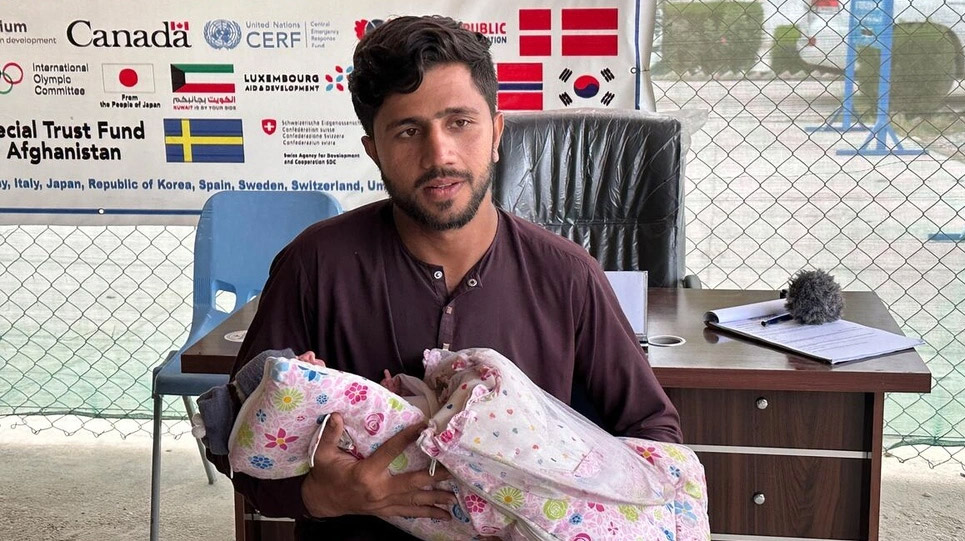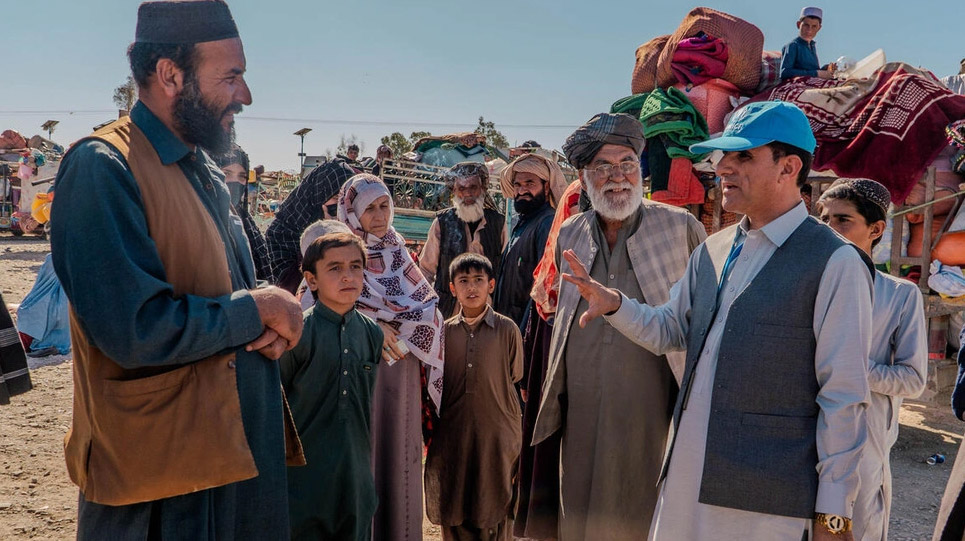UNHCR, November 17, 2023
Forced returns from Pakistan deepen Afghanistan’s humanitarian crisis
Hundreds of Thousands of Afghans are Returning to their Country from Pakistan with no Work or Shelter.

Caroline Gluck
Abdul made the decision to leave Pakistan, the country where he had spent all his 23 years, in a matter of hours.
He and his family, who include a baby son, hurriedly packed what they could in the night and set off for the border with Afghanistan the next morning. It was just one day before a 1 November deadline set by the Government of Pakistan for over 1 million undocumented foreigners to return to their countries. After the deadline, immigration enforcement measures would be applied.
Refugees like Abdul were officially exempted from the Government’s repatriation plan, which was announced on 3 October, but UNHCR, the UN Refugee Agency, and other UN agencies, have received reports that registered refugees and other Afghans holding legal documents are also facing pressure from law enforcement authorities to leave Pakistan.
Abdul had heard similar reports from Afghan community leaders in Karachi. “It was better to leave than being caught and arrested by the police,” he said. “In 24 hours, our lives changed.”
In total, more than 350,000 people have returned to Afghanistan since the announcement, and the number arriving at borders exhausted and in need of emergency assistance continues to grow.
Starting from zero
Pakistan is host to 1.3 million registered Afghan refugees while another 840,000 hold Citizenship Cards that give them some protection. A further 1.5 million Afghans are estimated to be living in Pakistan without any documentation, including some 600,000 who arrived in the country following Afghanistan’s takeover by the de facto authorities in August 2021.
Days after arriving in Afghanistan, Abdul is still dazed by his family’s sudden departure. At a UNHCR centre in Samarkhel, in north-eastern Nangarhar province, they have received protection counselling and been provided with assistance, including a return cash grant, vaccinations and health checks. But Abdul remains concerned about their future. Like many of those arriving, it is his first time in Afghanistan. He was born in Pakistan, where he worked as a shopkeeper, selling fabrics in a local market.

Abdul with his 28-day-old son at a UNHCR centre in Samarkhel, Nangarhar.© UNHCR/Caroline Gluck
“I’m the elder son and responsible for the family. Finding work is our main concern,” he said. “My father went as a refugee to Pakistan and started from zero, just as we are doing now.”
UNHCR staff and humanitarian partners are scrambling to monitor and provide assistance to the large-scale influx of returning Afghans arriving at two official border crossings with Pakistan – Torkham, in Nangarhar province, and Spin Boldak, in Kandahar province. It is a daunting task on top of the ongoing humanitarian crises in Afghanistan affecting over two thirds of the population.
At the border crossing point in Spin Boldak, father-of-eight Assadullah has just arrived from Pakistan in a colourfully painted truck loaded with household belongings. He left Afghanistan at the age of eight, following the Soviet invasion in 1979, and spent 44 years in Quetta, Pakistan. Despite his many years there, he felt he had no choice but to leave.

Assadullah (left) talks to a UNHCR staff member after arriving to Spin Boldak with his family. He lived in Pakistan for more than 40 years.© UNHCR/Oxygen Empire Media Production
“Recently, we felt so much harassment. They were searching our homes, arresting us on the streets, taking our money and not accepting our refugee cards. We thought things would improve, but they got worse day by day.”
Restrictions imposed by the Government of Pakistan mean that returnees cannot bring with them more than 50,000 rupees (US$173) in cash. Like Abdul, Assadullah is worried about starting over in Afghanistan. “We have no house, no job, nothing. But at least there is peace, and no-one is harassing us.”
Competing humanitarian needs
In recent years, the number of Afghan refugees choosing to return home through UNHCR’s voluntary repatriation programme has been relatively low – 6,424 in 2022. This year, more refugees have been approaching UNHCR requesting to return, with numbers rising dramatically in October after the return deadline was announced by Pakistan and reaching 24,000 by mid-November. UNHCR’s programme provides support to returning refugees, including protection assistance and a cash grant.
Many recent arrivals, like father-of-12, Obaidullah, are currently staying with relatives in Jalalabad and elsewhere until they can find housing and work.
“I have a big family and I’m worried how I’m going to support them; how we can find a proper place to live. I’m finding it hard to find daily work.”
His eldest son, Imran, is trying to get a passport to find work to help support the family. Meanwhile his English-speaking daughter, 18-year-old Kainat, is devastated by the move. “I studied in Pakistan and my dream was to become a doctor. This opportunity is closed to me in Afghanistan,” she said.
The abrupt return of hundreds of thousands of Afghans just before the onset of winter is expected to worsen the country’s already severe humanitarian crisis, with greater competition for scarce resources – including housing, health services, and jobs. At the same time, humanitarian agencies are struggling with substantial funding shortfalls as well as trying to respond to the devastating earthquakes in western Herat province in October.
“The mass arrivals couldn’t have happened at a worse time,” said UNHCR’s Representative in Afghanistan, Leonard Zulu. “We are dealing with many competing humanitarian needs and now huge numbers of arrivals, many without any family support or coping mechanisms here. It makes for a very grim winter and a difficult time ahead.”
The de facto authorities and ordinary Afghans are also rallying to support the new arrivals – providing tents, cash assistance for families, help with transport, food and other items – but the challenges ahead are enormous.
Characters Count: 7241
